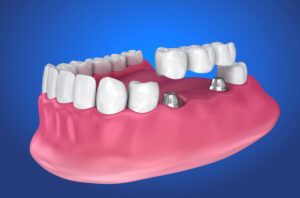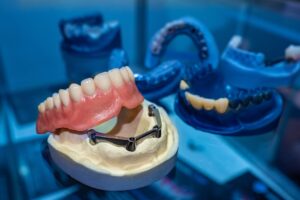Many people who have lost a tooth or had a tooth extracted years ago are surprised to learn they have bone loss when they visit an oral surgeon or prosthodontist to talk about dental implants. Yet bone loss is a common diagnosis among people interested in replacing their teeth with a surgical restoration.
The good news, though, is that most cases of bone loss can be mitigated through bone grafting. In Baton Rouge, LA, bone grafting has helped countless individuals become candidates for full-arch and single dental implants. But why does bone loss happen in the mouth? Read on to learn more.
The Role of Teeth in Maintaining Healthy, Strong Bones
Most people only think of the part of their teeth that they see every day. However, the root of the tooth—which is hidden by gum and bone—plays a vital role in keeping the jawbone healthy and robust.
Specifically, the tooth root stimulates the bone around it. The stimulation encourages bone to continue to grow. Unless something interferes with this stimulation process, such as untreated progressive gum disease, the bone should remain healthy.
What happens when a tooth falls out, needs to be removed, or gets knocked out during a traumatic event and is never replaced? Essentially, the bone loses its source of stimulation. But it does something more than just stop growing: It begins to be reabsorbed into the body.
Over time, reabsorption changes the shape of the jawbone, causing a “sunken in” appearance at the gums. Reabsorption also reduces the density of the surrounding bone matter.
Overcoming Bone Loss to Receive Dental Implants
When an oral surgeon realizes that a patient who wants dental implants has extensive bone loss, the oral surgeon likely will recommend a procedure called a bone graft.
A bone graft involves surgically placing grafting material at the location where the oral surgeon expects to place the dental implants. After several months, the grafting material will fuse with the existing bone, making it healthy and strong enough to provide a stabilized foundation for a dental implant.
Bone grafting in Baton Rouge, LA, can be done in either the upper or lower jaw. In the upper jaw, it is referred to as a “sinus lift.” The reason is simple: The procedure pushes bone safely into the empty sinus cavity to make room for the grafting material.
It can take about six months for a bone graft site to properly heal. Afterward, the oral surgeon will re-evaluate the patient and, if all has gone well and there are no other complications, will make plans for dental implant placement surgery.
Putting Treatable Oral Bone Loss in the Past
Whether you know or just suspect you have bone loss in your mouth, you may still be able to receive dental implants. Contact the Fusion Implant Center in Prairieville, LA, close to Baton Rouge, LA, for a bone grafting and dental implant consultation. Our five doctors include four oral surgeons and a prosthodontist.
Together, the doctors bring more than 50 years of experience to the art and science of helping patients become candidates for dental implants. Contact our doctors, Drs. R. Leo Regan, Michael Casadaban, David Bulot, Steven Nelson, and Kit Kiebach, in our office in Prairieville, Louisiana to schedule your next appointment today!




